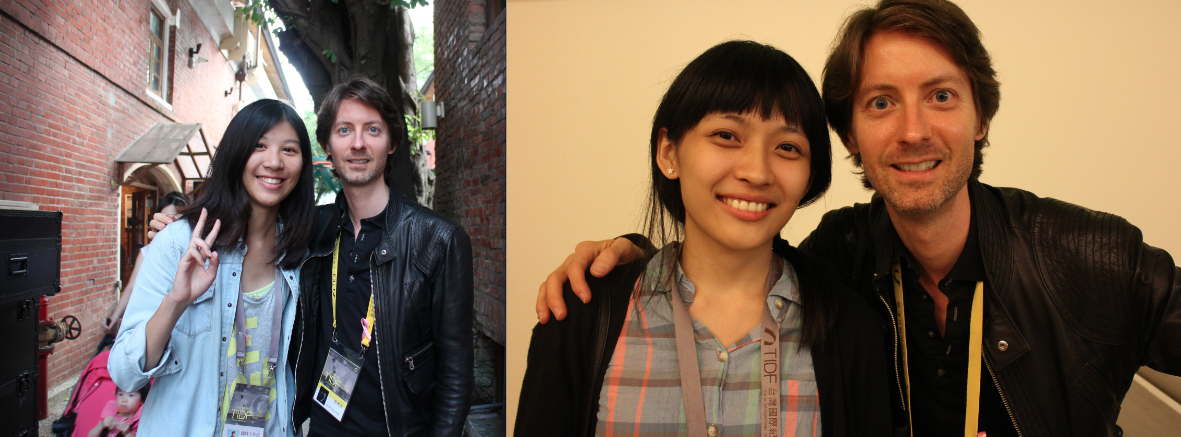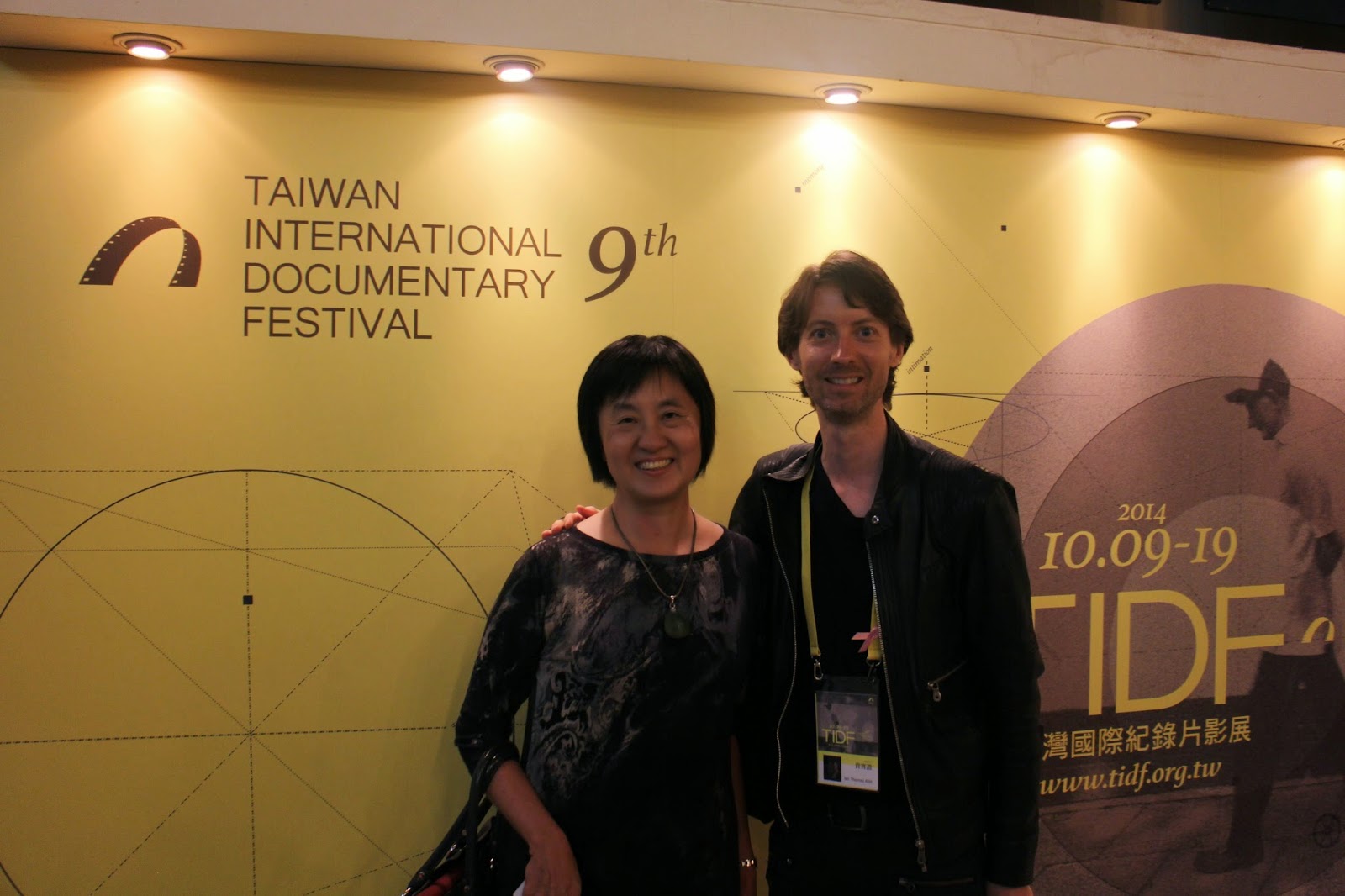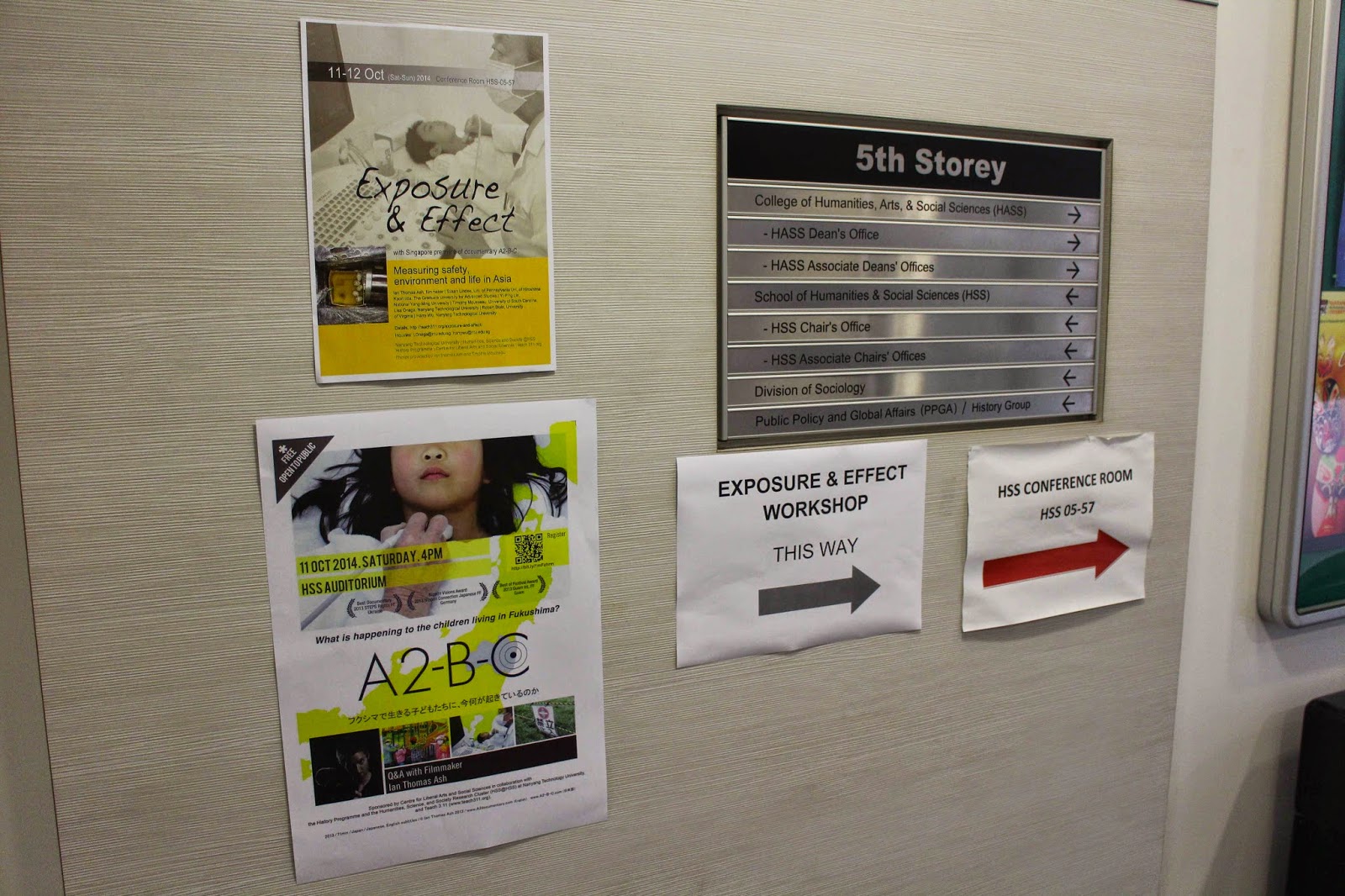For the last 36 hours, I have had the great honour of participating in the Teach.311-sponsored workshop "
Exposure and Effect: Measuring safety, environment and life in Asia" (
INFO) held at the School of Humanities and Social Sciences at Nanyang Technological University, Singapore.
The issue of ionizing radiation interacting with the environment has
become a disaster to think with in Asia following the catastrophes in
northeastern Japan on March 11, 2011. Awareness of radiation in
post-disaster sites, the environment, and in workplaces, has lodged
anxieties inseparable from everyday life and various imagined futures
that implicate societies beyond the archipelago. (full workshop description HERE).
Co-organizer Dr. Harry Wu (
PROFILE) opened the workshop with his paper "
Riding the Whirlwind, Directing the Storm: The Mental Health Unit Experts of the WHO on Peaceful Use of Atomic Energy" during which he shared the following quote from the WHO Constitution which felt like the perfect way to begin our discussion:
Dr. Wu also quoted
the UN Charter , Article 55 which states that "Inadequate provision of health is one of the indirect causes
of war."
In the afternoon, Susan Lindee, Visiting Professor, IDEC, Hiroshima University, and Janice and Julian Bers Professor of the History of Science, University of Pennsylvania (
PROFILE), presented "
An epidemiology without end: The Radiation Effects Research Foundation and scientific planning for unknown future risk". In her introduction, Dr. Lindee extended the theory of “patient in waiting", the idea that we will all eventually become a patient, to “survivor in waiting”, that we all have the potential to be affected by a future (nuclear) incident.
Dr. Kaori Iida, from the Graduate University for Advanced Studies (Sokendai), Japan (
PROFILE), presented "
International Genetics Symposia in 1956: Discussing Lysenkoism and radiation in postwar Japan". As a simple filmmaker, all of the papers presented at the workshop were well-above my head, and I must admit to finding myself feeling way out of my league and very quiet during the sessions in the morning.
Covering a topic very close to my heart, Nanyang Technological University's Lisa Onaga (
PROFILE) presented "
Measuring the particular: The metamorphosis of low dose radiation effects research in Japan.
" Dr. Onaga suggested we
should be considering
“not only what is an acceptable dose, but what is an acceptable scientific
study.”

There was plenty of time for fellowship and
exchange of ideas, with delicious lunches and coffee breaks held on the
balcony with a beautiful view of the campus.
In the evening, the Singapore Premier of my film 'A2-B-C' (screening
INFO) was held. This is the second time for this film to be used during an academic conference about issues of radiation exposure (the first time was
HERE in Germany earlier this year), and I am so honoured for my work to be used in this way.
During the Q&A, I urged the people in attendance, including all the academics from the workshop, to remember that the numbers in data represent individual people. Sometimes we talk about certain risks being "negligible"or having "only a slight increase", but we tend to forget that when a person becomes sick, to them, it is 100%.


All films to be screened in Singapore must first pass the censors and receive certification, and to be honest, I wasn't convinced that 'A2-B-C' would be approved. With all that has happened over the past 18 months (like
THIS visa issue), I seem to be in a constant state of holding my breath and waiting for the other shoe to drop. 'A2-B-C' was, however, eventually approved by the censors and given a PG rating.
Perhaps it may seem like I was being a bit paranoid, but I had reason for my doubts: my first film, '
the ballad of vicki and jake' (2006, UK, website
HERE), was banned in Singapore in 2007. '
the ballad' co-producer and DOP Ken Kwek wrote about what happened in a Straits Times article "
Film Bans: Detailed reasons, please" published on April 30, 2007. Ken subsequently had
THIS short film banned by the censors in Singapore, but it seems he will be having the last laugh: his feature directorial debut "
Unlucky Plaza" recently premiered at Toronto International Film Festival (
INFO). Despite his busy schedule preparing to fly to Poland the next day for the European Premier of "
Unlucky Plaza" in the Warsaw Film Festival, Ken came to the screening of 'A2-B-C'. We picked up right where we had left off, and it is hard to believe that it has been 10 years since we last met.


In the evening, the presenters at the workshop were treated to a traditional dinner of crabs Singapore-style, and it was a delicious and messy good time!
The next day, Timothy Mousseau presented "Consequences of Radiation in the Environment for Individuals, Populations and Ecosystems: Lessons from Chernobyl, Fukushima and Other Hot Places". During his introduction, Dr. Mousseau shared that there have been 600 Nuclear Power Plants and three major accidents to date. Continuing, he said, "That is a 1/200 chance of an accident at a Nuclear Power Plants". He then asked: "Would you get on plane if it had a one in 200 chance of not landing?"

I first met Dr. Mousseau at a congress in Germany in March (
STORY) and our paths crossed again last month when I moderated a press conference he gave in Tokyo (story and photos
HERE). Now, here in Singapore, we were asked to have a "
taidan", a public conversation, about our work and our crossing paths, in front of an audience of academics. When introducing this "
taidan" she titled "
Orbiting in the field: Ecology and filmmaking in Tohoku Japan", organizer Lisa Onaga stated that it was extremely unusual, and perhaps even the first time, for a biologist and a filmmaker to be brought together for this type of discussion at an academic conference.
Over the past few years, filmmaker Ian Thomas Ash and biologist
Timothy Mousseau have orbited around each other in the course of their
fieldwork in and around Fukushima, Japan. One traces human stories; the
other tracks signs of biological change in wildlife. Both have and
continue to pursue important questions about the exposure of bodies to
radiation. What conversations may arise if Ian Ash and Tim Mousseau are
brought momentarily into the same gravity well? What new insights may be
drawn about the difficulties, challenges and futures of conducting work
in the field that has come to be known as Fukushima? Taidan is the Japanese term for a face-to-face public dialogue. In this taidan,
the filmmaker and biologist engage in a series of questions that we
hope will provide provocative and constructive food for thought.

In the afternoon session "Challenging Mainstream Science: Trichloroethylene and Female Electronic Workers’ Occupational Diseases in Taiwan", Yi-Ping Lin, from the National Yangming University, Taiwan, asked "Whose science, whose knowledge? Why is it so difficult to support health of women industrial workers?". Dr. Lin observed that toxicological studies are performed on male mice and rats and then only on the kidney and liver which is why there is no information on how industrial chemicals, for example, impact female cancers.
The final paper was "Money and Mercury: Minamata Disease and the limits of Japan’s Postwar Democracy" given by Robert Stolz from the University of Virginia. Dr. Stolz traced fascinating (and scary) connections between victims of Japan's industrial and nuclear contamination tragedies.
The workshop ended with a brain-storming session about what discoveries had been made and what ideas the participants had for publication. I never dreamed I would have a place at the table during such a discussion. The names of some of the publications to which this workshop's findings may be submitted was mind-blowing. As a simple practitioner of filmmaking, I could never contribute to such academic writing, but the group still found a way to include my experiences: some of the discoveries that were made during the "taidan" with Dr. Mousseau may be included in in the paper in transcript form.
After just 36 hours in Singapore, I am now on my to Taiwan for the Asian Premier of my new film, '-1287' (
INFO).
I can not express how grateful I am for these amazing experiences from which I am learning so much. But sometimes things are so surreal that I have trouble believing all of this is really happening and even have moments where I have to think about what month it is or what country I am in. That's normal, right? ;)

















































